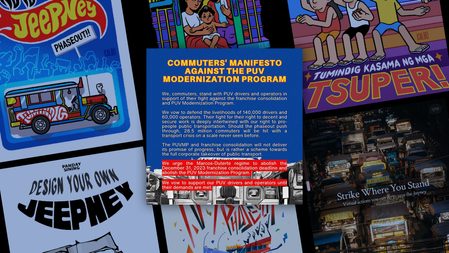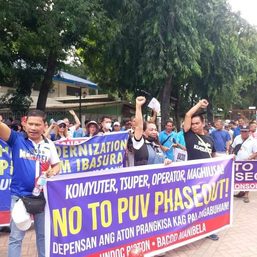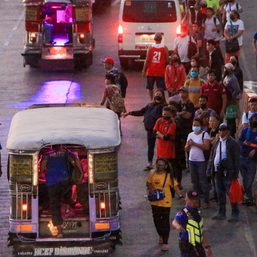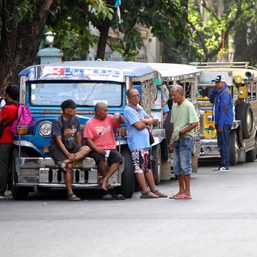SUMMARY
This is AI generated summarization, which may have errors. For context, always refer to the full article.

MANILA, Philippines – Even with only about half of jeepneys in Metro Manila consolidating before the December 31 deadline, the government maintained that the controversial move will not lead to livelihood loss for drivers or higher transport fares.
In the National Capital Region (NCR), only 21,655 or 51.34% of jeepneys were able to consolidate before the deadline. Similarly, only 1,400 or 59.33% of UV Express vehicles consolidated. Nationwide, the consolidation figures stand at 111,581 units (73.96%) for jeepneys and 15,844 (82.03%) units for UV Express, according to the latest figures provided by the Land Transportation Franchising and Regulatory Board (LTFRB).
Still, this means that tens of thousands of public utility vehicles (PUVs) could soon lose their right to operate because of their failure to consolidate.
The government doesn’t see this leading to jeepney drivers losing their livelihood because affected drivers could be absorbed by other cooperatives or corporations.
“Ang mga drivers po ngayon, supposedly ay walang hanapbuhay dahil wala na ‘yung mga operator (Drivers right now supposedly don’t have jobs anymore becuase their operators are gone), but this is not the situation. OTC has contacted different cooperatives nationwide,” Office of Transportation Cooperatives Chairman Jesus Ferdinand Ortega said in a press conference on Friday, January 5.
“We were assured by the cooperatives na sila po ay tatanggap ng mga drivers doon sa operators na hindi po nag-consolidate (that they will accept drivers from operators that were unable to consolidate),” he said.
According to Ortega, drivers displaced by operators who did not consolidate will be “badly needed” by cooperatives and corporations.
Why? Cooperatives and corporations will take over the routes previously handled by the operators who failed to consolidate.
Meanwhile, Ortega argued that the decision whether to consolidate or not – and therefore whether to continue operating or not – was a “business decision” made by jeepney operators. Now that the December 31 deadline has passed, jeepney operators no longer have a chance to form a consolidated entity.
Operators who did not consolidate will only have until January 31, 2024 to operate along select routes, after which the LTFRB may begin due process proceedings to cancel their franchise.
Ortega also address the statement of House Speaker Martin Romualdez that “corrupt practices may have tainted” the PUV modernization program.
“Definitely, wala pong katotohanan (there’s no truth to it),” Ortega said on Friday, adding that the DOTr “will be there” in any hearing called by Congress on the issue.
Gov’t refutes fears of P50-jeepney fare
The government also defended the PUV Modernization Program against fears that its implementation could lead to a big-time fare hike.
“Paying the bank loans used to acquire the modern PUVs will be obligation of the cooperative, not by individual drivers who are members of the cooperative,” the DOTr said in a statement on Friday. “Loan payments will not determine increases in fares, which is approved exclusively by the LTFRB primarily due to increases in fuel prices. Other considerations for fare increases include effect of economy and affordability of commuters.”
The transportation department also criticized the “falsehoods” being spread as attempts by minority groups to “sow fear.”
“They are attempts by the minority oppositors to the PUVMP to continue to be relevant despite government’s intent to finally implement the long-delayed program for the benefit of commuters and drivers/operators,” the DOTr added.
Think tank IBON Foundation earlier said that jeepney fares could reach up to P50 in five years because of the program, as cooperatives and corporations pay back loans for modern jeepneys and try to make a profit.
Several groups such as Bayan, Anakbayan, and PISTON have also warned that the consolidation deadline could lead to an “imminent transport crisis,” which the government also denied. Jeepney drivers and operators – led by transport groups PISTON and MANIBELA – also rose up in protest against the program throughout 2023. – Rappler.com
1 comment
How does this make you feel?



![[Under 3 Minutes] When will we see modern jeepneys on the road?](https://www.rappler.com/tachyon/2024/04/francisco-motors-modern-jeepney-prototype-1.jpg?resize=257%2C257&crop=590px%2C0px%2C1012px%2C1012px)









The Department of Transportation is free to criticize the “falsehoods” being spread by specific groups. Soon, it will be known who is speaking the truth and who is spreading falsehoods. It is hoped that those “falsehoods (loss of jobs, increase in transport fare)” will turn out to be false; otherwise, the former jeepney operators and Filipino commuters in Metro Manila will suffer.